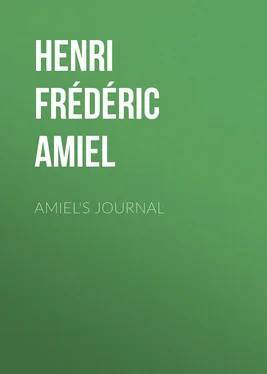Henri Frédéric Amiel - Amiel's Journal
Здесь есть возможность читать онлайн «Henri Frédéric Amiel - Amiel's Journal» — ознакомительный отрывок электронной книги совершенно бесплатно, а после прочтения отрывка купить полную версию. В некоторых случаях можно слушать аудио, скачать через торрент в формате fb2 и присутствует краткое содержание. Издательство: Иностранный паблик, Жанр: literature_19, foreign_antique, foreign_prose, Зарубежные любовные романы, на английском языке. Описание произведения, (предисловие) а так же отзывы посетителей доступны на портале библиотеки ЛибКат.
- Название:Amiel's Journal
- Автор:
- Издательство:Иностранный паблик
- Жанр:
- Год:неизвестен
- ISBN:нет данных
- Рейтинг книги:5 / 5. Голосов: 1
-
Избранное:Добавить в избранное
- Отзывы:
-
Ваша оценка:
- 100
- 1
- 2
- 3
- 4
- 5
Amiel's Journal: краткое содержание, описание и аннотация
Предлагаем к чтению аннотацию, описание, краткое содержание или предисловие (зависит от того, что написал сам автор книги «Amiel's Journal»). Если вы не нашли необходимую информацию о книге — напишите в комментариях, мы постараемся отыскать её.
Amiel's Journal — читать онлайн ознакомительный отрывок
Ниже представлен текст книги, разбитый по страницам. Система сохранения места последней прочитанной страницы, позволяет с удобством читать онлайн бесплатно книгу «Amiel's Journal», без необходимости каждый раз заново искать на чём Вы остановились. Поставьте закладку, и сможете в любой момент перейти на страницу, на которой закончили чтение.
Интервал:
Закладка:
Was it that all the while Amiel felt himself sure of his revanche that he knew the value of all those sheets of Journal which were slowly accumulating under his hand? Did he say to himself sometimes: “My friends are wrong; my gifts and my knowledge are not lost; I have given expression to them in the only way possible to me, and when I die it will be found that I too, like other men, have performed the task appointed me, and contributed my quota to the human store?” It is clear that very early he began to regard it as possible that portions of the Journal should be published after his death, and, as we have seen, he left certain “literary instructions,” dated seven years before his last illness, in which his executors were directed to publish such parts of it as might seem to them to possess any general interest. But it is clear also that the Journal was not, in any sense, written for publication. “These pages,” say the Geneva editors, “written au courant de la plume —sometimes in the morning, but more often at the end of the day, without any idea of composition or publicity—are marked by the repetition, the lacunae , the carelessness, inherent in this kind of monologue. The thoughts and sentiments expressed have no other aim than sincerity of rendering.”
And his estimate of the value of the record thus produced was, in general, a low one, especially during the depression and discouragement of his later years. “This Journal of mine,” he writes in 1876, “represents the material of a good many volumes; what prodigious waste of time, of thought, of strength! It will be useful to nobody, and even for myself—it has rather helped me to shirk life than to practice it.” And again: “Is everything I have produced, taken together—my correspondence, these thousands of Journal pages, my lectures, my articles, my poems, my notes of different kinds—anything better than withered leaves? To whom and to what have I been useful? Will my name survive me a single day, and will it ever mean anything to anybody? A life of no account! When all is added up—nothing!” In passages like these there is no anticipation of any posthumous triumph over the disapproval of his friends and the criticism of his fellow-citizens. The Journal was a relief, the means of satisfying a need of expression which otherwise could find no outlet; “a grief-cheating device,” but nothing more. It did not still the sense of remorse for wasted gifts and opportunities which followed poor Amiel through the painful months of his last illness. Like Keats, he passed away, feeling that all was over, and the great game of life lost forever.
It still remains for us to gather up a few facts and impressions of a different kind from those which we have been dwelling on, which may serve to complete and correct the picture we have so far drawn of the author of the Journal. For Amiel is full of contradictions and surprises, which, are indeed one great source of his attractiveness. Had he only been the thinker, the critic, the idealist we have been describing, he would never have touched our feeling as he now does; what makes him so interesting is that there was in him a fond of heredity, a temperament and disposition, which were perpetually reacting against the oppression of the intellect and its accumulations. In his hours of intellectual concentration he freed himself from all trammels of country or society, or even, as he insists, from all sense of personality. But at other times he was the dutiful son of a country which he loved, taking a warm interest in everything Genevese, especially in everything that represented the older life of the town. When it was a question of separating the Genevese state from the church, which had been the center of the national life during three centuries of honorable history, Amiel the philosopher, the cosmopolitan, threw himself ardently on to the side of the opponents of separation, and rejoiced in their victory. A large proportion of his poems deal with national subjects. He was one of the first members of “ L’Institut Genevois ,” founded in 1853, and he took a warm interest in the movement started by M. Eugene Rambert toward 1870, for the improvement of secondary education throughout French-speaking Switzerland. One of his friends dwells with emphasis on his “ sens profond des nationalités, des langues, des villes ”—on his love for local characteristics, for everything deep-rooted in the past, and helping to sustain the present. He is convinced that no state can live and thrive without a certain number of national prejudices, without à priori beliefs and traditions. It pleases him to see that there is a force in the Genevese nationality which resists the leveling influences of a crude radicalism; it rejoices him that Geneva “has not yet become a mere copy of anything, and that she is still capable of deciding for herself. Those who say to her, ‘Do as they do at New York, at Paris, at Rome, at Berlin,’ are still in the minority. The doctrinaires who would split her up and destroy her unity waste their breath upon her. She divines the snare laid for her, and turns away. I like this proof of vitality.”
His love of traveling never left him. Paris attracted him, as it attracts all who cling to letters, and he gained at one time or another a certain amount of acquaintance with French literary men. In 1852 we find him for a time brought into contact with Thierry, Lamennais, Béranger, Mignet, etc., as well as with Romantics like Alfred de Vigny and Théophile Gautier. There are poems addressed to De Vigny and Gautier in his first published volume of 1854. He revisited Italy and his old haunts and friends in Germany more than once, and in general kept the current of his life fresh and vigorous by his openness to impressions and additions from without.
He was, as we have said, a delightful correspondent, “taking pains with the smallest note,” and within a small circle of friends much liked. His was not a nature to be generally appreciated at its true value; the motives which governed his life were too remote from the ordinary motives of human conduct, and his characteristics just those which have always excited the distrust, if not the scorn, of the more practical and vigorous order of minds. Probably, too—especially in his later years—there was a certain amount of self-consciousness and artificiality in his attitude toward the outer world, which was the result partly of the social difficulties we have described, partly of his own sense of difference from his surroundings, and partly again of that timidity of nature, that self-distrust, which is revealed to us in the Journal. So that he was by no means generally popular, and the great success of the Journal is still a mystery to the majority of those who knew him merely as a fellow-citizen and acquaintance. But his friends loved him and believed in him, and the reserved student, whose manners were thought affected in general society, could and did make himself delightful to those who understood him, or those who looked to him for affection. “According to my remembrance of him,” writes M. Scherer, “he was bright, sociable, a charming companion. Others who knew him better and longer than I say the same. The mobility of his disposition counteracted his tendency to exaggerations of feeling. In spite of his fits of melancholy, his natural turn of mind was cheerful; up to the end he was young, a child even, amused by mere nothings; and whoever had heard him laugh his hearty student’s laugh would have found it difficult to identify him with the author of so many somber pages.” M. Rivier, his old pupil, remembers him as “strong and active, still handsome, delightful in conversation, ready to amuse and be amused.” Indeed, if the photographs of him are to be trusted, there must have been something specially attractive in the sensitive, expressive face, with its lofty brow, fine eyes, and kindly mouth. It is the face of a poet rather than of a student, and makes one understand certain other little points which his friends lay stress on—for instance, his love for and popularity with children.
Читать дальшеИнтервал:
Закладка:
Похожие книги на «Amiel's Journal»
Представляем Вашему вниманию похожие книги на «Amiel's Journal» списком для выбора. Мы отобрали схожую по названию и смыслу литературу в надежде предоставить читателям больше вариантов отыскать новые, интересные, ещё непрочитанные произведения.
Обсуждение, отзывы о книге «Amiel's Journal» и просто собственные мнения читателей. Оставьте ваши комментарии, напишите, что Вы думаете о произведении, его смысле или главных героях. Укажите что конкретно понравилось, а что нет, и почему Вы так считаете.












